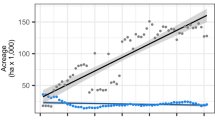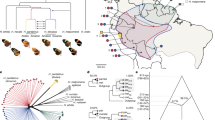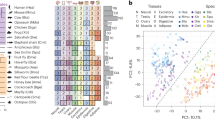Abstract
ONE of the major problems of contemporary population genetics is how to account for the large amount of genetic variation occurring in natural populations. Considerable controversy exists between those people proposing that the variation is adaptively neutral, and those arguing that most of the variation is maintained by balancing selection. One of the processes of balancing selection postulated, is based on the idea that different genetic variants are favoured in different environmental niches. We report results from an experiment designed to test this hypothesis in which populations of Drosophila were exposed to experimental environments of various degrees of heterogeneity. The rationale is simple—if genetic variation is adaptively neutral, all populations should maintain about the same amount of genetic variation; if the ‘environmental heterogeneity’ hypothesis is correct, the degree of genetic variation in a population should be correlated with the degree of heterogeneity of its environment.
This is a preview of subscription content, access via your institution
Access options
Subscribe to this journal
Receive 51 print issues and online access
$199.00 per year
only $3.90 per issue
Buy this article
- Purchase on Springer Link
- Instant access to full article PDF
Prices may be subject to local taxes which are calculated during checkout
Similar content being viewed by others
References
Ayala, F. J., Drosophila Information Serv., 43, 185 (1968).
Ayala, F. J., Powell, J. R., Tracey, M. L., Mourão, C. A., and Pérez-Salas, S., Genetics, 70, 113–139 (1972).
Dobzhansky, Th., Genetics and the origin of species (Columbia University Press, New York, 1951).
Mather, K., Evolution, 9, 52–61 (1955).
Ludwig, W., Zool. Anzeiger (Neue Ergebniβe und Probleme der Zoologie) 145, 516–537 (1950).
Levene, H., Am. Naturalist, 87, 331–333 (1953).
Li, C. C., Am. Naturalist, 89, 281–296 (1955).
Dempster, E. R., Symp. quant. Biol., 20, 25–32 (1955).
Cain, A. J., and Sheppard, P. M., Am. Naturalist, 88, 321–326 (1954).
Da Cunha, A. B., Burla, B. H., and Dobzhansky, Th., Evolution, 4, 212–235 (1950).
Thoday, J. M., and Boam, T. B., Heredity, 13, 205–218 (1959).
Clarke, C. A., and Sheppard, P. M., Heredity, 14, 163–173 (1960).
Beardmore, J., in Essays in honor of Theodosius Dobzhansky, 299–313 (Appleton-Century-Crofts, New York, 1970).
Powell, J. R., Science, 174, 1035–1036 (1971).
King, J. L., Science, 176, 545 (1972).
Author information
Authors and Affiliations
Rights and permissions
About this article
Cite this article
MCDONALD, J., AYALA, F. Genetic response to environmental heterogeneity. Nature 250, 572–574 (1974). https://doi.org/10.1038/250572a0
Received:
Revised:
Published:
Issue Date:
DOI: https://doi.org/10.1038/250572a0
This article is cited by
-
10.1007/BF00350373
CrossRef Listing of Deleted DOIs (2011)
-
Soft selection and quantitative genetic variation: a laboratory experiment
Heredity (1991)
-
Breeding structure of natural populations of Drosophila buzzatii: effects of the distribution of larval substrates
Heredity (1990)
-
An experimental analysis of the relationships between fitness components and malic enzyme genotypes inTribolium confusum
Biochemical Genetics (1988)
-
Experimental evidence for the adaptive value of sexual reproduction
Genetica (1987)
Comments
By submitting a comment you agree to abide by our Terms and Community Guidelines. If you find something abusive or that does not comply with our terms or guidelines please flag it as inappropriate.



